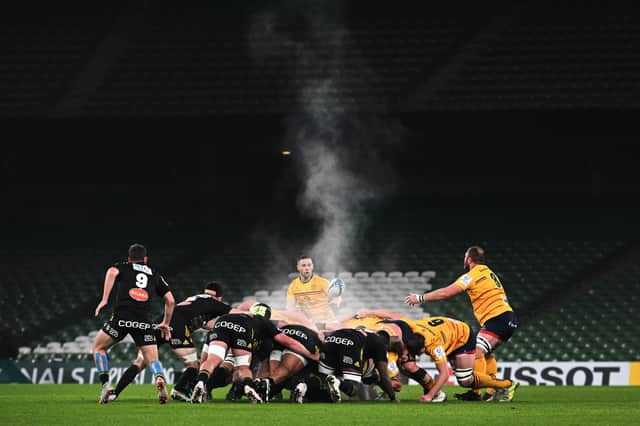Fixing rugby's scrum is on my Christmas list - as well as no more injuries to Scotland players


The set scrum has become an embarrassment and a bore. Watching a number of European Cup matches last weekend, I thought you wouldn’t have needed all your fingers and thumbs to count the number of times the ball was delivered to the scrum-half. Instead, almost always the referee’s whistle sounded and he awarded a penalty or free kick. Indeed, this often happened even before the ball was put in. The main purpose of the scrum now seems to be “winning a penalty”. So the scrum takes up a lot of time, there being often several “resets”, and I doubt if many spectators are satisfied.
I have no solution, though I am sure most of us would like to see one. An attempt a few years ago to insist that the ball be put in straight was soon abandoned. Since it is now fed directly into the second row, perhaps referees should order the side in possession to use it or lose it. As it is, the scrum-half’s blindside break from a set scrum is now almost as rare as a white blackbird though two of the best 9s, the sublime Antoine Dupont and Ireland’s Jamison Gibson-Park, are like scrum-halves of old alert to the possibly of a dash. Even so, the opportunity rarely presents itself without quick clean ball being delivered. Sadly few packs seem eager to provide this.
Advertisement
Hide AdAdvertisement
Hide AdMeanwhile, Glasgow and Edinburgh both won their European matches last weekend, though both perhaps made a harder job of doing so than they should have. Edinburgh are at least playing with a good deal of confidence and ambition. Too much ambition sometimes, one may say. In the first half against Castres they turned down several chances to kick a penalty goal, instead going ambitiously for a try, and failing. Of course, a converted try is twice as valuable as a penalty goal, but failing to score the try means you come away with nothing. It is noticeable that even the strongest French clubs – Toulouse, Racing 92 and La Rochelle – rarely turn down the chance to kick a goal, especially in the first half. Given that in Emiliano Boffelli Edinburgh have one of the most reliable goal-kickers in the world, the decision repeatedly to forego the chance of three points seemed strange.
Still, though Edinburgh struggled to impose themselves for times last week, they did well to win given that they were without their most dangerous attackers Darcy GrahaM, Mark Bennett and Duhan van der Merwe being absentees, while Blair Kinghorn had to leave the field injured early in the match. Their replacements all did pretty well, but one couldn’t help thinking that the scoreboard would have moved more quickly if Graham and Van der Merwe were playing.
The number of injured Scotland players is beginning to look a bit worrying. Graham and Zander Fagerson seem unlikely to be fit for the first Six Nations match at Twickenham on the first Saturday in February. Last season’s young rising star Rory Darge is, it seems, some way short of returning. Hamish Watson, currently recovering from concussion, may not play for some time. Scott Cummings is on the injured list again, likewise an assortment of hookers. Stuart Hogg got a knock last weekend and left the field before the hour mark, but, happily, there’ s no word of a serious injury. Nevertheless, the picture looks a bit gloomier than it did after the November internationals. Gregor Townsend will surely have watched the inter-city game last night with at least a couple of fingers crossed.
Our mood has hardly been improved by the change of coaches in England and Wales, and not only because some of us fancied we had taken Eddie Jones’s measure. Football regularly shows that a change of manager tends to pep up a team that has been struggling, even if the only real change is a change of mood. Steve Borthwick may provide that in England; the return of Warren Gatland will surely do so in Wales, even if his last international venture – the Lions tour in South Africa – made mostly for very dull rugby.